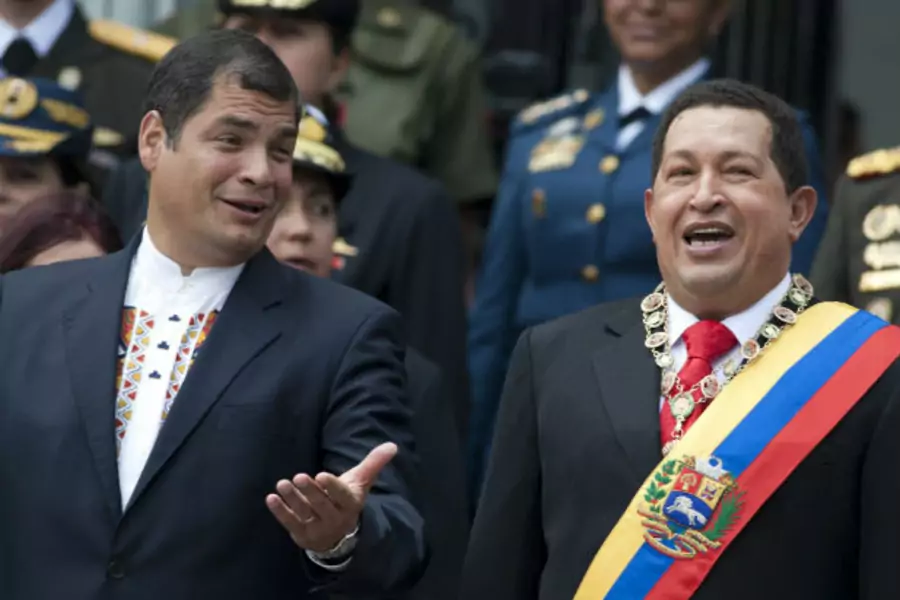Guest Post: Correa is No Chávez

This is a guest post by Stephanie Leutert, a research associate here at the Council on Foreign Relations who works with me in the Latin America program.
Venezuelan President Hugo Chávez has been in full campaign mode: speaking, singing, and exhorting the dangers of his opponent, Henrique Capríles Radonski. Despite his visible public activities, rumors and speculation continue to swirl, with attention focused on his health far more than on his policies. The prospect of a Venezuela without Chávez, and more broadly the Bolivarian Alliance for the Americas, or ALBA, and its regional initiatives, has led many to speculate who would or could fill the void. In the regional arena, Ecuador’s mercurial president Rafael Correa stands as a top contender.
More on:
The two leaders’ apparent bonhomie and similar policies have led some to joke that Correa seems to be already auditioning for the job. The left-leaning presidents share a common rhetoric (frequently labeling opponents as oligarchs or imperialists), charismatic personalities, a disdain for (and often exaggeration of) U.S. influence in the region, and a taste for forging relationships with some of the world’s most notorious pariah states (Iran and Belarus). In doing so, they have also whipped up domestic approval ratings (at 57 percent, Correa enjoys one of the highest in the hemisphere) and continuously survived elections (aided by uneven electoral playing fields).
Part of their popularity stems from increases in social spending for the poor and marginalized groups. High global commodity prices and significant oil reserves have bankrolled ambitious social programs in both countries. Combined with strong domestic economic growth, these programs have changed the lives of their recipients. Ecuador has more than halved its extreme poverty in the past decade and pulled its national poverty levels from a half to a third the population, while GDP per capita has more than doubled. Venezuela has also seen its poverty headcount drop and GDP per capita rise from $5,000 to over $10,000 in the past ten years.
Both leaders too have consolidated power in the presidency. Both Chávez and Correa have done little to strengthen (and at times actively weakened) already flimsy systems of checks and balances. And recent crackdowns on private media have garnered global attention and condemnation, as well as stories of executive influence on the judiciary. To be fair, Chávez and Correa inherited flawed democracies and arrived in office facing deeply entrenched interest groups. But the two leaders’ policies have nonetheless been geared more toward shifting power to their advantage rather than strengthening democratic institutions.
Despite their similarities, Correa can’t hope to fill Chávez’s regional shoes. The most obvious reason is simply that Ecuador is not Venezuela. With double the population, triple the landmass, and five times more annual oil production, Venezuela has been able to back up its initiatives with significant funds. While Correa’s rhetoric is as feisty, his bank account is much less, limiting his ability to guide South America’s affairs.
Washington too will deny Correa a starring role on the hemispheric stage. Having learned that provocative responses to Chávez’s taunts just strengthened his hand, U.S. officials are unlikely to do so again. Instead, a cautious approach and benign neglect will make it difficult, if not impossible, for Correa to gain Chávez-style notoriety. Without the resources or the ideological juxtaposition, it is unlikely that any one person could fill the leadership void. Organizations such as the Union of South American Nations (Unasur) or the Market of the South (Mercosur) may be able to step in and take on some of the initiatives, but—despite Correa’s best efforts—there won’t be another Chávez.
More on:
 Online Store
Online Store